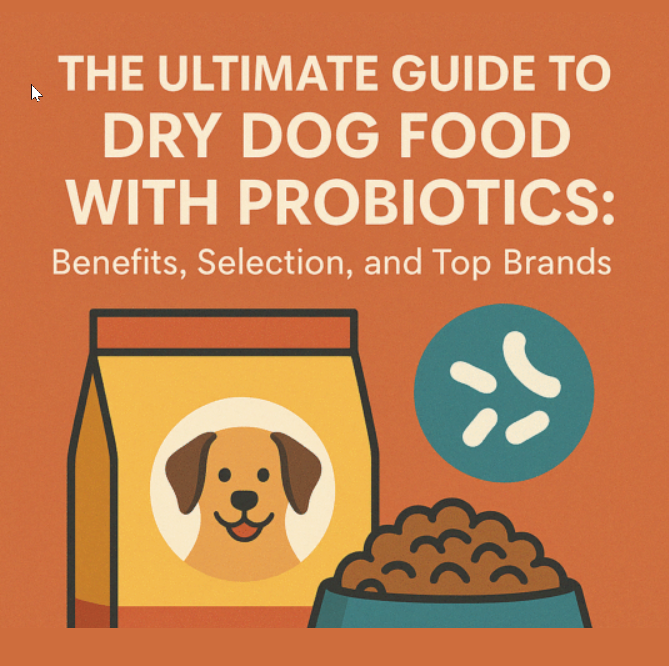In the evolving world of canine nutrition, probiotics have emerged as a key component for supporting optimal dog health.
While these beneficial bacteria have long been associated with yogurt and other fermented human foods, they’re now becoming increasingly common in dry dog food formulations.
This comprehensive guide explores everything pet parents need to know about probiotic-enhanced kibble—from how it works to how to choose the best option for your four-legged family member.
Understanding Canine Gut Health and Probiotics
A healthy digestive system is fundamental to your dog’s overall well-being. The canine gut contains trillions of microorganisms that form a complex ecosystem known as the microbiome. This internal community plays critical roles in:
- Digestion and nutrient absorption
- Immune system function and regulation
- Protection against harmful pathogens
- Production of certain vitamins
- Mood and behavior regulation (through the gut-brain connection)
Probiotics are live beneficial bacteria that, when consumed in adequate amounts, can help maintain or restore balance to this delicate ecosystem. Dr. Karen Becker, DVM, notes: “A balanced microbiome is essential for your dog’s health. When this balance is disrupted—whether through stress, illness, antibiotic use, or dietary factors—various health issues can emerge.”
The Rise of Probiotics in Dry Dog Food
Traditionally, probiotics were primarily available as supplements for dogs. However, pet food manufacturers have recognized the benefits of incorporating these beneficial bacteria directly into kibble formulations. This innovation allows for daily, consistent delivery of probiotics through a dog’s regular diet.
Common Probiotic Strains in Dry Dog Food
Not all probiotics are created equal. Different strains offer different benefits. In premium dry dog foods, you might find:
- Bacillus coagulans: Heat-resistant and shelf-stable, making it ideal for kibble
- Enterococcus faecium: Supports digestive function and immune health
- Lactobacillus acidophilus: Helps maintain intestinal microbial balance
- Bifidobacterium animalis: Assists in the breakdown of food and nutrient absorption
- Lactobacillus casei: Aids in preventing intestinal inflammation
Benefits of Choosing Dry Dog Food with Probiotics
Digestive Health Advantages
- Reduce episodes of diarrhea, both antibiotic-associated and acute
- Diminish gas and bloating
- Improve stool quality and consistency
- Help manage symptoms in dogs with inflammatory bowel conditions
- Aid in the digestion of complex nutrients
Immune System Support
With approximately 70% of the immune system located in the gut, supporting digestive health directly impacts overall immunity. Research published in the Journal of Veterinary Science demonstrated that dogs receiving certain probiotic strains showed:
- Increased production of immunoglobulins
- Enhanced activity of immune cells
- Reduced inflammatory markers
- Better response to vaccinations
Skin and Coat Improvements
- Reduced itching and scratching
- Decreased skin inflammation
- Improved coat shine and reduced shedding
- Faster healing of minor skin issues
Convenience Factor
- No need to remember daily supplements
- No struggle with hiding pills or powders
- Consistent dosing without measurement
- Cost-effectiveness compared to premium supplements
Potential Drawbacks to Consider
Probiotic Viability Concerns
- Using heat-resistant probiotic strains (particularly Bacillus species)
- Adding probiotics after the heating process
- Encapsulating probiotics for protection
- Including higher numbers of CFUs (colony-forming units) to account for some loss
Storage Considerations
- Check expiration dates carefully
- Store kibble in cool, dry conditions
- Keep food in its original bag or in airtight containers
- Buy appropriately sized bags to ensure freshness
How to Choose Quality Probiotic Dry Dog Food
1. Probiotic Specificity and Potency
- Specify exact strains
- List CFU (colony-forming units) counts
- Include multiple complementary strains
- Mention when probiotics are added (pre or post-processing)
2. Prebiotic Components
Prebiotics are indigestible fibers that feed beneficial bacteria. Look for ingredients like:
- Chicory root
- Inulin
- Fructooligosaccharides (FOS)
- Beet pulp
- Sweet potatoes
3. Overall Nutritional Quality
- Named animal protein sources as the first ingredients
- Limited artificial additives, colors, and preservatives
- Appropriate fat-to-protein ratios
- Whole food sources of vitamins and minerals
4. Manufacturer Reputation and Research
- Conduct clinical studies
- Work with veterinary nutritionists
- Implement strict quality control
- Offer transparent manufacturing information
Special Considerations for Different Dogs
For Puppies
- Easily digestible proteins
- DHA for brain development
- Calorie density for growth
- Strain diversity
For Senior Dogs
- Joint-supporting and anti-inflammatory ingredients
- Moderate, high-quality protein
- More prebiotic fiber
For Dogs with Specific Health Concerns
- Limited ingredient diets for sensitivities
- Grain-free with digestive enzymes
- Targeted probiotic strains
Transitioning to Probiotic Dry Dog Food
- Start with a small amount (10% new, 90% old)
- Increase gradually over 7–10 days
- Monitor stool quality
- Extend the transition if needed
- Consider adding digestive enzymes during transition
Some dogs may experience minor stool changes during the first few weeks as their gut adjusts to new probiotic levels. This typically resolves as balance is restored.
Popular Brands and Product Lines
- Purina Pro Plan Veterinary Diets FortiFlora
- Hill’s Science Diet Gastrointestinal Biome
- Royal Canin Gastrointestinal
- Blue Buffalo True Solutions Perfect Digestion
- Wellness CORE Digestive Health
- Diamond Naturals with Probiotics
- Solid Gold with Protected Probiotics
When Additional Supplements May Be Beneficial
- During/after antibiotics
- Stressful periods (travel, boarding)
- After illness
- Food transitions
- Active working or sporting dogs
Always consult your veterinarian before adding supplements, as dosage and strain selection matter.
Conclusion: Is Probiotic Dry Dog Food Right for Your Pet?
Probiotic-enhanced dry dog food offers a convenient, effective way to support your canine companion’s digestive and overall health on a daily basis. The science behind canine microbiome health continues to evolve, with growing evidence supporting the benefits of probiotic inclusion in regular diets.




